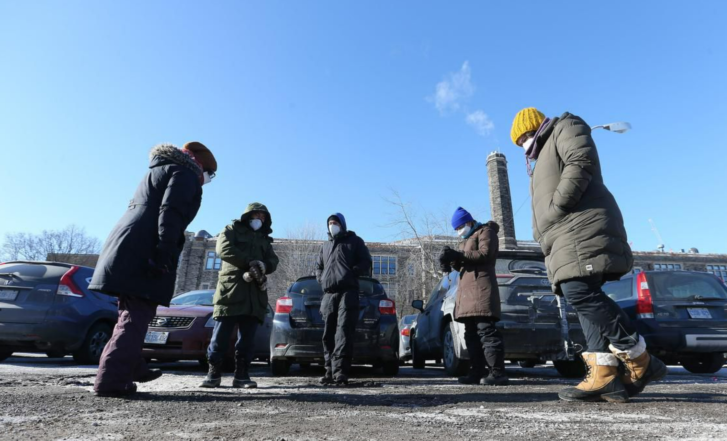Group of Bloor Collegiate teachers raise concerns about poor ventilation, corridors packed with maskless students during lunchtime.
A handful of Toronto secondary teachers spent the last two days in the parking lot outside their school, refusing to work over what they say are unsafe conditions, while students inside resumed in-person learning.
The five teachers from Bloor Collegiate Institute individually invoked their right to refuse work, and remained inside their cars, occasionally garnering waves from students at school windows, and puzzled looks from passersby.
The teachers say widespread community transmission of COVID-19, and the recent return to in-person learning, have amplified their concerns over issues such as poor ventilation and packed corridors with maskless students during lunchtime. The school, however, says the health and safety of students and staff is a top priority.
“We’re trying to raise the alarm,” explained English teacher Melanie Willson, speaking to the Star on Thursday morning from inside her car with two colleagues Leela Acharya and Martha Heckman, all of them wearing N95 masks.
“We’re trying to finally get some action on the safety issues in the building that are impacting students and teachers and other education workers.”
Next to them, for a second straight day, was another vehicle with teachers David Mandelzys and David Lush.

In a letter to parents on Thursday afternoon, principal Janice Gladstone said the school is following “stringent health and safety measures” recommended by the Ministry of Education, Toronto Public Health and the Toronto District School Board. They include masking, physical distancing, the use of HEPA filters and COVID-19 daily screening.
“We are continuing to work with school staff to address concerns,” wrote Gladstone, noting the work refusal process involves representatives from the board, the union and the Ministry of Labour trying to reach a resolution.
Because Bloor Collegiate, which also housed ALPHA II Alternative School, is currently under construction, students and staff from those schools have been relocated to Central Technical School.
The Central Tech building, located near Harbord and Bathurst Streets, now houses students from the three schools, totalling about 1,600.
Willson said the teachers have repeatedly brought up health and safety concerns this year but “there’s been no real action.”
They ramped up their efforts Wednesday, when many schools in the GTA resumed in-person learning. Schools across the province were set to reopen on Jan. 17, after being forced by the government to pivot to online learning for nearly two weeks because of climbing COVID case counts, driven by the highly-transmissible Omicron variant.
But some boards, including those in Toronto, didn’t open schools on Monday due to a major snowstorm, nor on Tuesday because massive cleanup efforts were underway.
So on Wednesday when Toronto students returned to class, the five teachers began a work refusal process. They say health and safety inspectors from the board and union have suggested possible strategies to address their concerns, but they have not been satisfied.
A spokesperson for the Ministry of Labour, Training and Skills Development confirmed an inspector has been assigned and an investigation is ongoing.
Sources told the Star the Ministry of Labour doesn’t believe schools meet the criteria of an unsafe work environment, and that the teacher unions were alerted to that early in January. Even without the N95 masks for teachers, the measures put in place in schools were enough, sources said.
As part of the work refusal process, the teachers are expected to be on school property during school hours. That’s why Wednesday and Thursday were considered work days and they were paid for them. Inside their cars, they worked on their laptops, marking, updating Google classroom and replying to student and parent emails.
The teachers say they have the backing of their colleagues, including those who have had to cover for them over the two days. The school has ensured students continue to be supervised.
Acharya, a social sciences teacher and guidance counsellor, says the “most pressing issue” is lunchtime.
“Students are congregated together in unventilated stairwells and hallways, sitting together in close proximity and are unmasked,” she said. “It’s a very unsafe situation, especially at lunch. It has a big impact, not only on students, but everybody else in the building.”
Willson notes that because many students live too far to go home for lunch, and frigid temperatures keep them indoors, they are “elbow to elbow, sitting on the ground in the hallway, with no masks on at lunchtime.” This is especially concerning because some students are not vaccinated, and those who are double-vaccinated may have waning immunity because in Ontario those under age 18 are not eligible for a booster.
“This is the situation in high schools all across the province. We’re no different. There are lots of high schools with well over 1,000 students who are eating in cafeterias, hallways and stairwells everyday. It’s exacerbated by the fact that we have combined schools (in one building) so there’s really absolutely no cohorting.”
The comment is echoed by Heckman, a science and math teacher, who notes “indoor dining in restaurants is not allowed, so how is it possibly safe in schools?”
“I don’t want to contract (COVID) and bring it home to my family, nor do I want that for my students and their families.”
That’s why she and the others plan on returning Friday morning — to the parking lot, not their classrooms — and anticipate more visits from inspectors.
“We’ll be back,” said Heckman. “I don’t know much about what will happen next … But we’ll be there.”
Article From: The Star
Author: Isabel Teotonio

